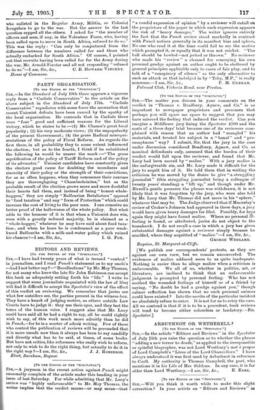SIR,—The matter you discuss in your comments on the verdict
in " Thomas v. Bradbury, Agnew, and Co." is so important to newspaper proprietors and pressmen that perhaps you will spare me space to suggest that you may have misread the feeling that induced the verdict. Can you imagine a Middlesex jury fining the Spectator £300 and the costs of a three days' trial because one of its reviewers com- plained with reason that an author bad " mangled " his materials, and treated his subject in a " banal" and " pre- sumptuous " way ? I submit, Sir, that the jury in the case under discussion considered Bradbury, Agnew, and Co. as nominal defendants only, assumed that the burden of their verdict would fall upon the reviewer, and found that Mr. Lucy had been moved by " malice." With a jury malice is the unforgiveable sin, and Mr. Lucy made it difficult for the jury to acquit him of it. He told them that in writing the criticism he was moved by the desire to give "a struggling journalist" (this struggling journalist being a colleague of twenty years' standing) a "lift up," and though under Mr. Birrell's gentle pressure the phrase was withdrawn, it is not likely that it was forgotten by the jury, who were also told by Mr. Lucy that Mr. Thomas did not move in his " sphere," whatever that may he. The Judge observed that if Macaulay's review of Croker's Johnson had appeared in these days, a jury would have given heavy damages for libel. Possibly, for hele again they might have found malice. Where no personal IT1- feeling is found, or attributed, juries do not object to the tomahawk. I do not recall a case in which a jury has given substantial damages against a reviewer simply because he scarified, where they acquitted of " malice."—I am, Sir, &c.,
GEORGE WEDLAKE.
Royston, St. Margaret-at-Cliffe.
[We publish our correspondents' protests, as they are against our own view, but we remain unconverted. The evidences of malice adduced seem to us quite inadequate. Nothing is easier than to allege malice when a criticism is unfavourable. We all of us, whether in politics, art, or literature, are .inclined to think that an unfavourable judgment is prompted by personal feeling. Who has not soothed the wounded feelings of himself or of a friend by saying, " No doubt he bad a grudge against you," though calmer reflection has shown that no such personal animus could have existed ? Into the merits of the particular incident we absolutely.refuse to enter. It is not for us to retry the case. All we contend is that if it is to be a precedent, book reviews will tend to become either colourless or laudatory.—ED. Spectator.]
ARBUTHNOT OR WETHERELL ?


































 Previous page
Previous page